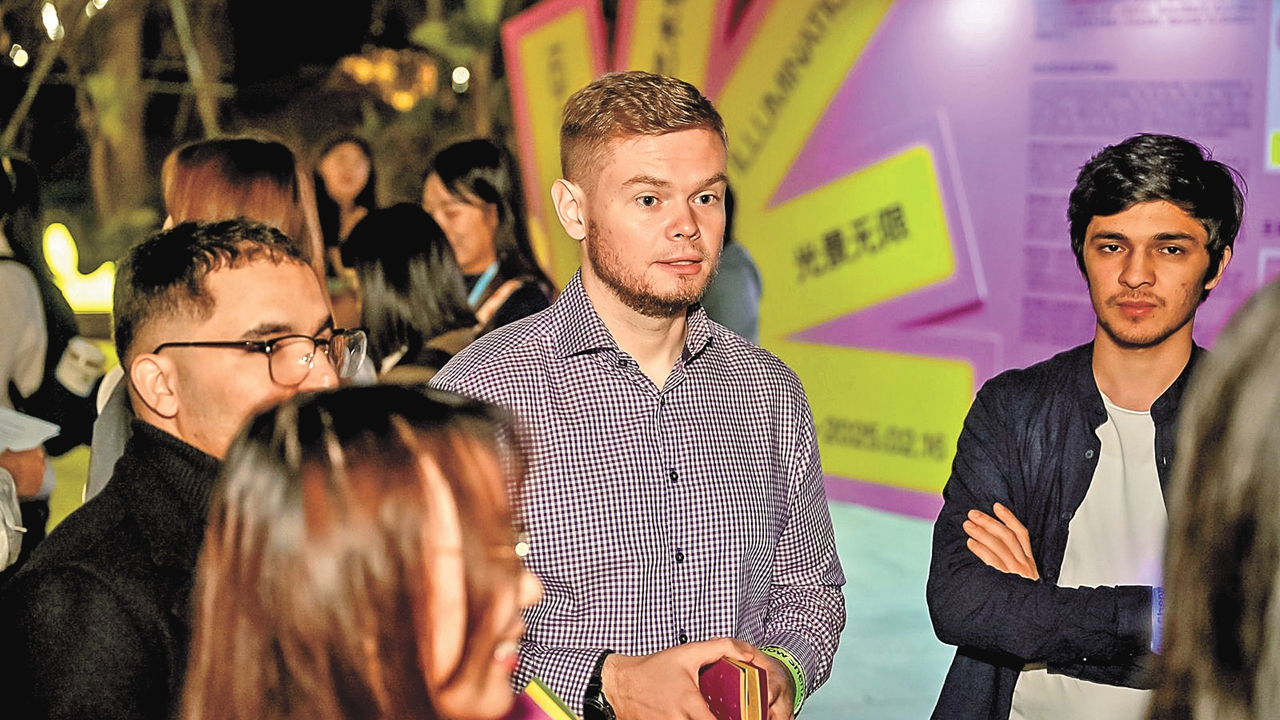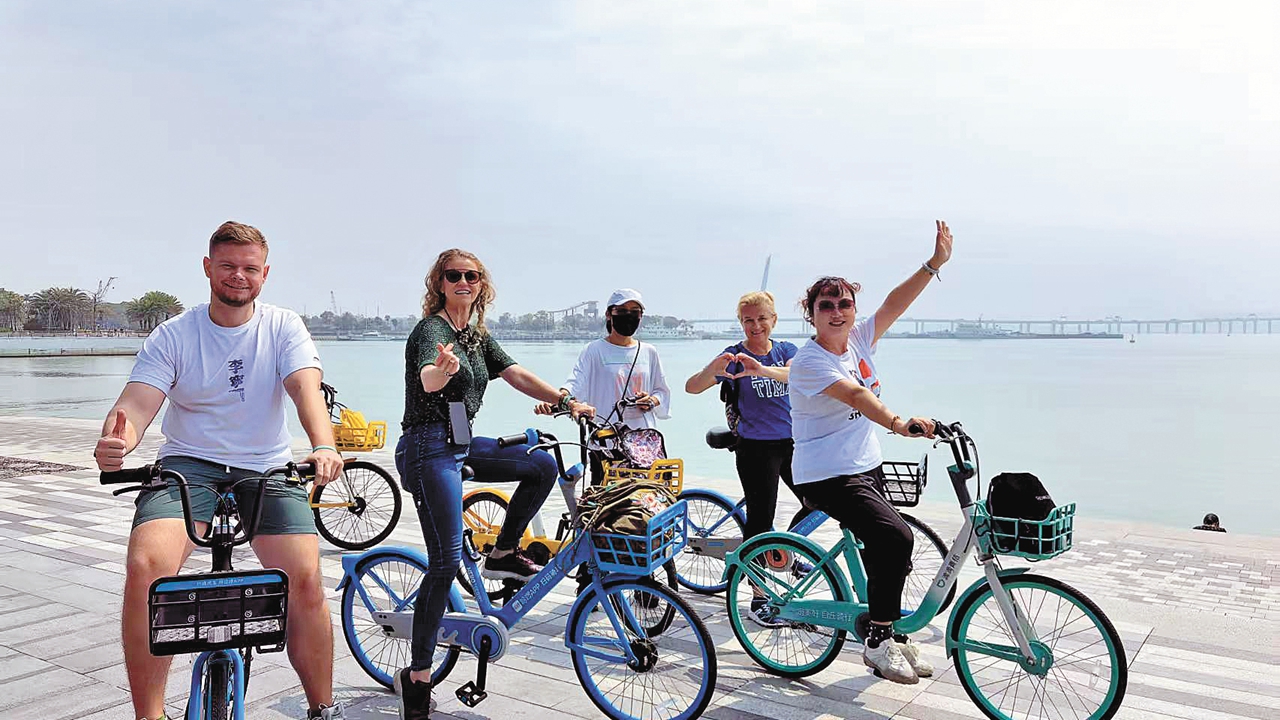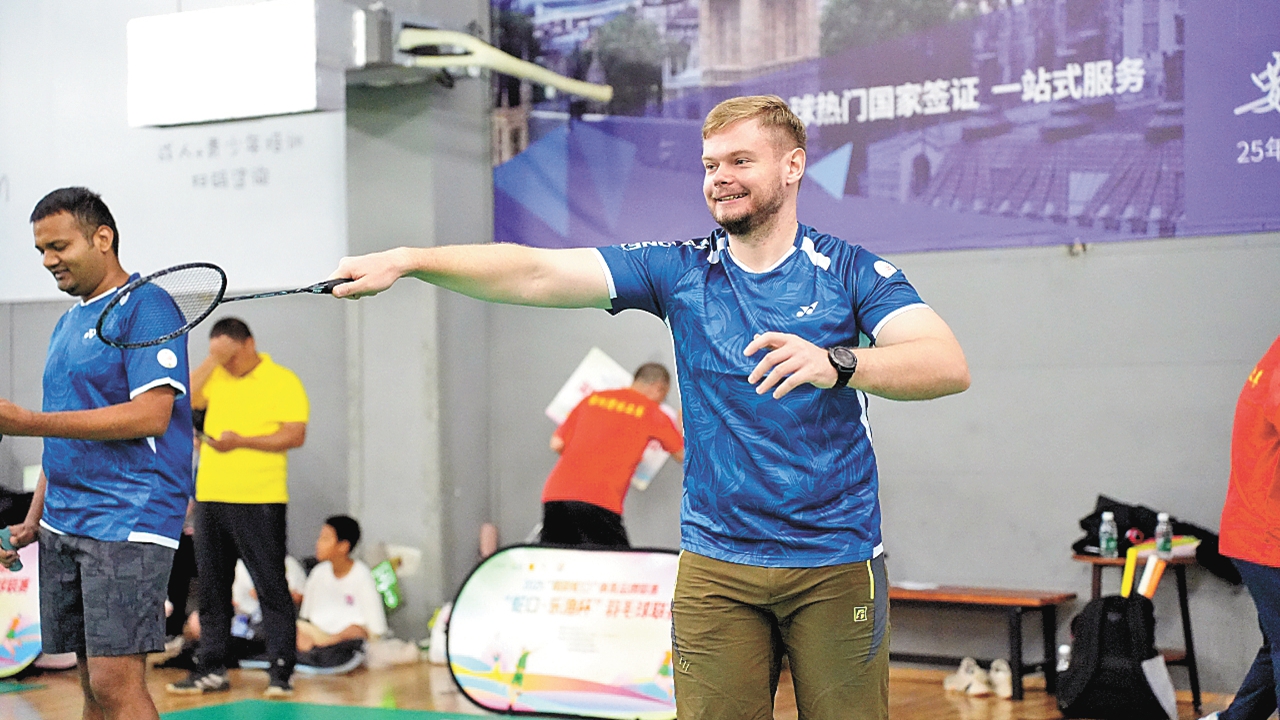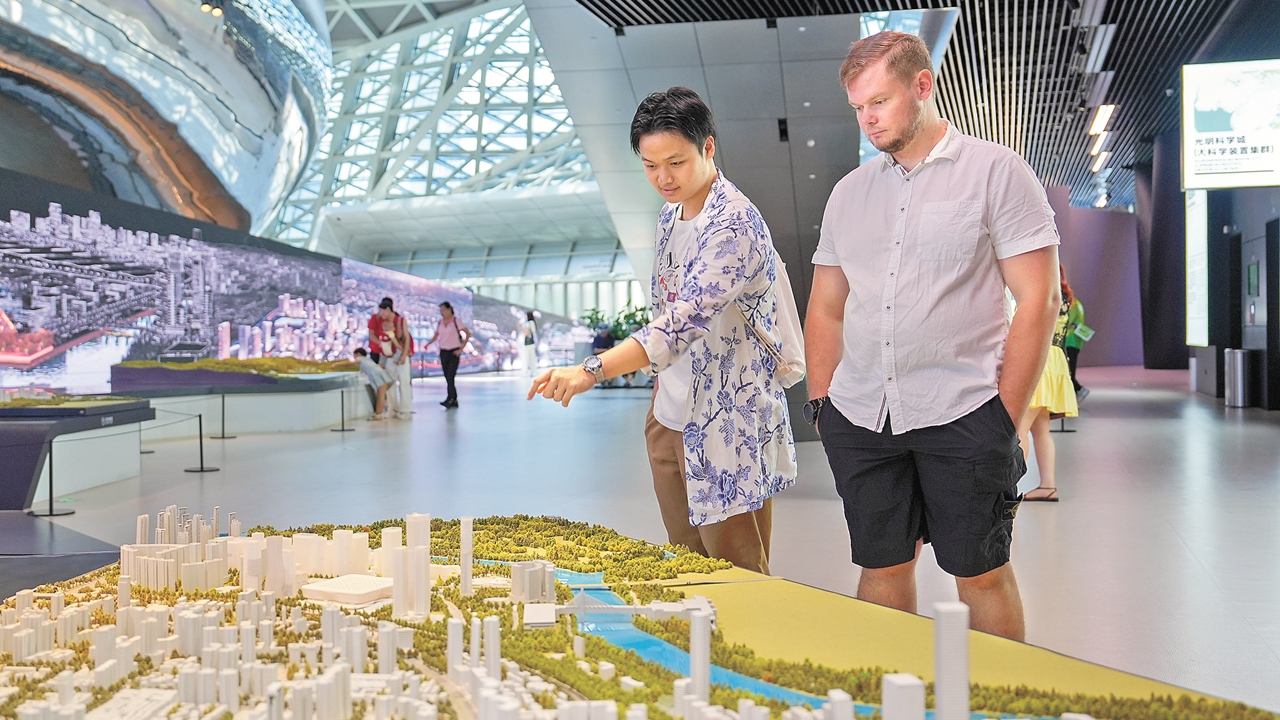Belarusian student charting a future in hardware hub
Writer: Zhang Yu | Editor: Lin Qiuying | From: Original | Updated: 2025-09-26
When Stanislau Kulaha decided to pursue a master’s degree in China, the map was wide open. The Belarusian student had already visited the country as a tourist, experiencing the global buzz of Shanghai, the unique energy of Hong Kong, and the tropical shores of Hainan. But for his studies, his compass pointed decisively to a younger, pulsating city on the southern coast — Shenzhen.
Now a student in the business administration program at the Harbin Institute of Technology, Shenzhen (HITSZ), Kulaha reflects on a decision that has reshaped his academic and personal horizons.
His story is not just one of geographical transition, but of immersion into a city that embodies China’s breakneck future, a multicultural academic environment, and a life that seamlessly blends high-tech pressure with tranquil parks — a balance he says is key to thriving here.
“I had heard a lot about Shenzhen at that time — that it is a very young, modern, technological city — and that immediately interested me,” Kulaha recalled. His research cemented his choice. “It’s in the south, which means excellent weather, it’s next to Hong Kong, and there’s access to all other Asian countries nearby.”
His journey from Brest to Shenzhen is a testament to the city’s growing pull as an international education and innovation hub, attracting ambitious minds from across the globe who are drawn by its unique alchemy of opportunity and ambition.
An unexpected global classroom
The first and most profound surprise for Kulaha upon arriving at HITSZ was the composition of his cohort. He had expected a rigorous academic environment, but he hadn’t anticipated the rich tapestry of cultures that would become his daily reality.
“The biggest surprise for me at the initial stage was that my classmates would be people from completely different countries,” he said. “It’s not only university education itself, but also this intercultural exchange with many classmates from Asia, from Africa — from all over the world, you could say.”
 Stanislau Kulaha (R) at a local event organized by the Shenzhen Foundation for International Exchange and Cooperation. Courtesy of the interviewee
Stanislau Kulaha (R) at a local event organized by the Shenzhen Foundation for International Exchange and Cooperation. Courtesy of the interviewee
This microcosm of global talent transformed his educational experience into something far broader than a curriculum. It became a continuous, living lesson in international perspectives.
“Everyone has their own culture; you get to know different countries through the people,” Kulaha noted. “This is actually very interesting.” He added, with a hint of amusement, that there are only a few students from Russia, and he is one of the only ones from Belarus. “For some reason, I wasn’t initially prepared for this, but it’s also very interesting.”
The academic resources at HITSZ have lived up to the high standards he expected. He praised the faculty, many of whom are globally recognized professionals who studied in the U.S., Europe, or China's Hong Kong and teach fluently in English. The campus itself is designed to facilitate deep work and collaboration.
“We have a huge library. All the buildings are equipped with everything necessary for studying,” Kulaha explained. “There is always a place to come and study, to hold group classes if you have a group project. There are also single, closed rooms if you need to seclude yourself in a quiet place. In general, access to resources is wonderful. There are no limitations for education.”
This extends beyond the campus gates. Shenzhen, he says, is filled with museums, cultural spaces, and venues that provide endless opportunities for enrichment. “It definitely won’t be boring here.”
Finding balance in a tech metropolis
Shenzhen is often characterized as a high-paced and high-pressure city where the relentless drive of innovation dictates the rhythm of life. For a graduate student, this intensity is palpable, especially during crunch times.
“Of course, there are difficult moments at the end of the semester when we have a lot of classes and many assignments to submit,” Kulaha admitted. “These processes were difficult enough; I really had to dedicate all my time to studying.”
Yet, what has struck him most is the city’s inherent capacity for balance. Contrary to the image of a concrete jungle solely dedicated to work, Shenzhen offers abundant opportunities to unwind. “There are many parks, many different spaces for relaxation where there are trees, plants, reservoirs where you can really rest, both body and spirit,” he described.

Stanislau Kulaha (L) joins other expats for bike-riding at Shenzhen Bay Park. Courtesy of the interviewee
This careful integration of nature within the urban fabric prevents the city from feeling like an overwhelming metropolis where one can only work. “There is a real balance between the city and nature, I would say, and that affects your energy balance,” Kulaha observed.
This environment is perfectly suited to the city’s nickname — the Silicon Valley of Hardware. Living in a city so intensely focused on technology and entrepreneurship has had a direct impact on his own ambitions.

Stanislau Kulaha plays badminton with friends. Courtesy of the interviewee
“It’s true, Shenzhen is famous for its many productions of various devices, computer hardware, and so on,” he said. “And how has it influenced me? I think it only inspires any person.”
He pointed to the regular news of local technological breakthroughs — the testing of new autonomous buses or flying cars — as a constant source of motivation. “We get these news regularly, and it only influences with inspiration and a desire to somehow join this, to join modern technologies, and possibly motivates you to study more seriously.”
A tapestry of cultures
Shenzhen’s identity is uniquely Chinese, yet it is a composite of the entire nation. As a relatively young city, it is populated by people who have come from every province of China, creating a dynamic cultural melting pot within one municipality.
Kulaha finds this internal diversity to be a significant advantage for a foreigner. “It’s wonderful that people from all over China are gathered in Shenzhen. There’s a mix of cultures here,” he said. “And this is actually very good for foreigners because, by living in one city, you can learn about the characteristics of different corners of China through the people.”

Stanislau Kulaha (R) at the Shenzhen Planning Exhibition at the Shenzhen Museum of Contemporary Art and Urban Planning in Futian District. The museum tour was organized by Shenzhen Daily on Aug. 16, 2025. Lin Jianping
This diversity manifests in the city’s culinary scene, its events, and most importantly, in the people one meets.
“Each province of China is known for its own culture, even its own dialect, and in Shenzhen, all these cultures mix.” This convergence, he notes, is surprisingly convenient. “It becomes very convenient for everyone because everyone speaks [standard] Mandarin, which is the most convenient circumstance for foreigners who want to learn Chinese.”
When asked for a memorable story, Kulaha didn’t hesitate to share about his experience with Chinese New Year, which was unlike anything he had known. “It all starts with an incredible number of fireworks and firecrackers everywhere on the street. I was even scared several times because there were explosions all around,” he laughed.
“Even when I was at home, it was all audible, and it lasts for several days. This was really my first experience of this; it doesn’t happen for so long and on such a scale in our countries.”
Building a future in the ‘City of Tomorrow’
Looking beyond graduation, Kulaha sees a clear path forward — one that sees him remain in Shenzhen. He views it as an excellent opportunity to deepen his understanding of Chinese culture and, crucially, to master the language.
“I think it’s a great opportunity to stay in Shenzhen, specifically in China, to further learn the culture and study the language,” he said, noting that his current program is in English. “In the end, I would like to master it.”
Staying in the city would also allow him to build a career and see China from a new perspective. “It would be a great opportunity for me to build a career, to not only see how everything works here from the student’s side, but also from the side of real experience in a real company, a real business. I consider this experience very valuable and would like to get it here.”
His advice to other international students considering Shenzhen is straightforward but comes with a caveat. “I would say it’s a wonderful opportunity. I would recommend it to anyone who really wants to study,” he affirmed, calling Shenzhen a very friendly, beautiful, and convenient city to live in.
“At the same time, you need to be prepared that not everything will be very easy. You will have to study really seriously because Shenzhen sets high standards in this regard, especially for those who want to stay.”
Kulaha concluded with strong praise for the city’s accessibility. “I think it’s one of the most friendly cities for foreigners,” he said, noting the bilingual signage and the young, internationally exposed population.
“So yes, I recommend it with all my might, but be prepared to work, so to speak,” he stated.